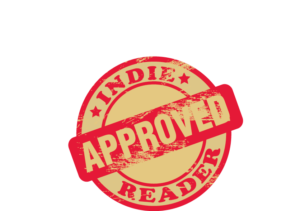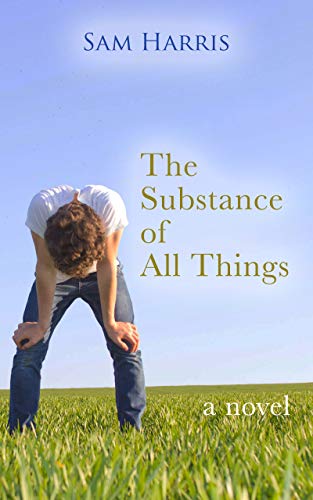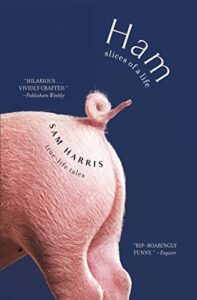
The Substance of All Things received a 4+ star review, making it an IndieReader Approved title.
Following find an interview with author Sam Harris.
What is the name of the book and when was it published?
The title is The Substance of All Things published July 1, 2020.
What’s the book’s first line?
“Everything that came forever after was determined by my father’s split-second decision to swerve.”
What’s the book about? Give us the “pitch”.
When Theo Dalton is six years old, his hands are irreparably damaged in a horrific car accident that takes his mother’s life. Six years later, during the sweltering summer of 1968 in rural Oklahoma, Theo meets Frank, a Native American outcast, and learns that he has the ability to heal through his disfigured hands.
As he explores the extraordinary, Theo desperately attempts to remain an ordinary boy. But when word of his gift spreads, Theo is shunned by the church for doing “the devil’s work.” He is immediately swept away by his Auntie Li, and into a world which ultimately threatens his life as he saves others’.
Told from Theo’s perspective some fifty years later, it is through his work as a therapist with a broken woman that he musters the courage to relive the summer that haunts him.
What inspired you to write the book? A particular person? An event?
I’d had a writer’s block for nearly a year until the idea came to me. I grew up in a rural town in Oklahoma much like the one in the book, so the place, feeling, the culture, the sky – everything, was very clear to me. I set it in 1968 because it was such a tumultuous year in our history, not too distant from my own time growing up there, with people confused and searching for answers in a changing culture. (And our current climate has many similarities.) The story involves a lot of Bible Belt religious zealotry, which was prevalent where I grew up. As a child, I was confused by it. By the idea of what God was. I was quite a misfit there, being gay and not interested in most things the other kids were interested in. Making the book’s protagonist a 12 year old boy, who is a bullied outsider because of his deformity, was something close to me in my own way. That he discovers he can heal through the touch of his maimed hands, I suppose, is a reflection of my passion for music and writing at an early age, which made me special instead of just different. All of the characters are based on amalgams of people I’ve known. The circumstances are completely fictional.
The other story, going back and forth, which is about adult Theo processing his past through his work as a therapist with a woman, came after the young Theo story. The idea came to me when a very good editor asked me, “What happens to adult Theo?” That question revealed so much to me, and made me really dig into the book in a whole new way, which not only created the entire B story, but informed what I’d already written, so that I had to go back and write richer, better.
What’s the main reason someone should really read this book?
It is my hope that my book will touch and inspire. I hope that it makes the reader laugh and also breaks some hearts. Story, of course, is everything in a book, but I hope that people are moved by the writing itself, and the visuals that I tried to create. I suppose every writer hopes for these things. I want the reader to fall in love with young Theo, his sister, his best friend, and even love to hate the villains. And the woman in therapy…. I hope that her story will reach deep into readers hearts. She is so real to me, so damaged, and yet strong and vibrant. It is a story of healing in all definitions of the word.
What’s the most distinctive thing about the main character? Who-real or fictional-would you say the character reminds you of?
My main character, young Theo, is distinctive in that his hands have been crippled in a horrible accident that took his mother’s life – and that he is able to heal people through the touch of those hands.
As far as literary characters, that’s tougher. I feel like Theo existed and I found him and wrote about him. So, he doesn’t really seem like anyone else to me, specifically. I suppose Ponyboy Curtis in “The Outsiders” shares some qualities with Theo. His quiet empathy. His confusion and his contemplation. His bravery. Theo is the boy on the playground who stays to himself. Who is more comfortable one on one than in a group. And he has to deal with very adult issues at a very young age.
If they made your book into a movie, who would you like to see play the main character(s)?
I can see Noah Schnapp (from “Stranger Things”) playing young Theo. I can imagine Jeff Bridges or William Hurt as older Theo. Chrissy Metz (from “This Is Us”) would be great as the woman in therapy, and Melissa McCarthy is such a good dramatic actress, and it would be amazing to see her tackle this character in a serious way.
When did you first decide to become an author?
I only became a legit author in 2012. I’ve written all my life, but mostly television and film scripts, plays and musicals. I’ve also written dozens and dozens of songs/lyrics. My first book, “HAM: Slices of a Life” was a memoir, which was released in 2014. “Substance” is my first novel. The dialogue and speech patterns of the characters in “Substance” is very informed by my having written so many scripts.
Is this the first book you’ve written?
My first book, “HAM: Slices of a Life” was published in 2014 by Simon & Schuster. It was turned into a one-man musical play and then the live show was filmed for television.
What do you do for work when you’re not writing?
I am an actor and singer and writer for TV/film. I think my work as an actor has informed the way I write – delving into a character, becoming them.
How much time do you generally spend on your writing?
When I am in the middle of a project – I get consumed with it. Time flies! I sometimes realize I’ve not come up for air or eaten anything for many hours. I look up and suddenly it’s dark outside! This book took 4 years to write, so obviously it wasn’t an everyday thing, though there were many times I didn’t do anything else for days. I wrote it quickly and edited it slowly. I don’t know how many drafts there were. However, I have a family. And my son was 7 when I first began the book, so, well… that was a bit of a distraction! He is my priority always.
Would you go traditional if a publisher came calling? If so, why?
I’ve had a major publisher and it’s great. There is a machine behind you with a budget and outreach, and publications to get reviews from, which are more difficult (or impossible) for an indie writer. However, I made the decision to go indie for many reasons, and we shall see how this plays out. I’m hoping that readers respond to the book and share. A big company can do great things in getting the word out, but ultimately, I read a book because a friend has told me it’s great. Or I read customer reviews. So, I’m really hoping for some traction as we get going.
Is there something in particular that motivates you (fame? fortune?)
I’ve been fortunate to have a successful career in show business. I’ve learned that if I am authentic in what I create, the rest takes care of itself. So, while we’d all like to make great money at our art, I feel that is the result, not the intention.
Which writer, living or dead, do you most admire?
William Faulkner. John Irving, Delia Owens. All for different reasons. But mostly because for each of them, beyond the wonderful stories, it’s about the quality of the prose – their ability to take me to places in my mind and heart that are far richer than any movie could convey.
Which book do you wish you could have written?
I know it’s a cliché answer, but “To Kill a Mockingbird” has reached so many and has affected so many lives. It feels like an old friend. Something to pass on to my son. It is beautifully written with a message that is timeless and universal. And it’s a coming-of-age story, which always steals my heart. I have a signed copy and it is very dear to me.
Last thoughts:
Finally, and I know that all writers will relate to this – a book is different from anything else. As I said, I’ve written for TV and film and the stage. And while those things can take time, years, to get produced, they are created in a relatively short amount of time, at least for me. Writing a novel is a commitment that is personal and emotional and raw in a way that all other medium is not. It’s a child that is born and nurtured and prepared for the world in a way that other medium is not. It’s a fuller experience. It ain’t for sissies! So, here I am – pushing the “send” button after “Substance” has lived on my laptop for all this time. And I want people to experience it. I want people to invest in these characters and this story and know them and become attached to them. I want it to speak to them in the way that a book I love speaks to me. That is my wish.

